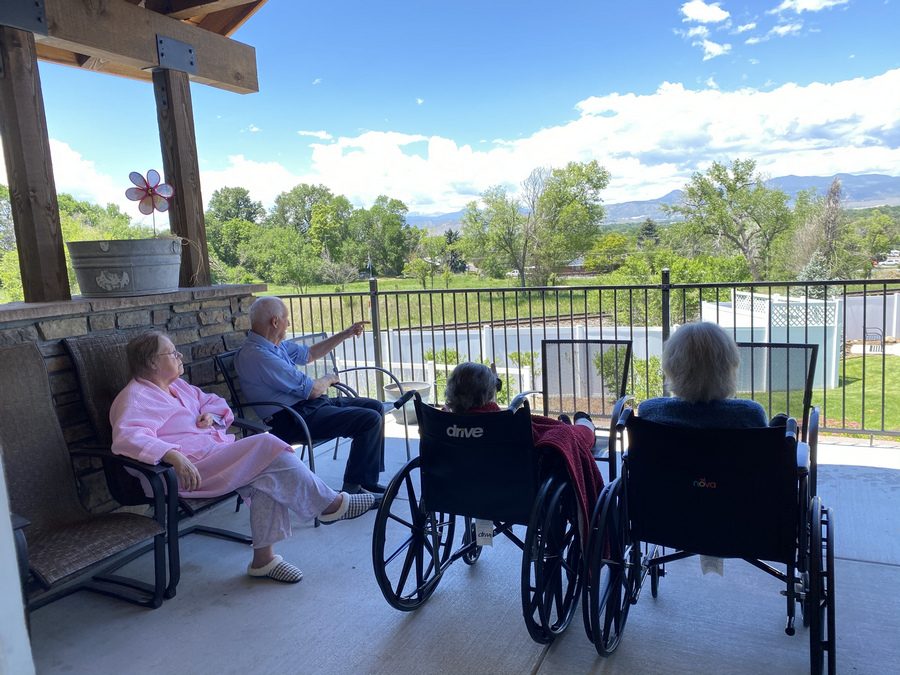Everything About Memory Treatment Services: Why Tiny Memory Care Residences Are an Excellent Selection
Memory treatment solutions play an important function in sustaining individuals with Alzheimer's and mental deterioration. Small memory care homes stand out for their personalized strategy and intimate setup. With lower staff-to-resident ratios, these homes cultivate more powerful connections and tailored care. Homeowners gain from improved social communications and a risk-free environment. As households explore alternatives, comprehending the one-of-a-kind advantages of tiny memory treatment homes ends up being important. What elements should be considered when picking the ideal home?
Recognizing Memory Care Services
While numerous may recognize with general senior care choices, comprehending memory care services is essential for households facing the difficulties of cognitive decrease. Memory care specifically accommodates people with conditions such as Alzheimer's condition and various other forms of dementia. These solutions supply an organized environment that concentrates on enhancing the quality of life for residents with specialized treatment and support.Memory care facilities are developed to assure safety and safety, typically including safeguarded settings to avoid wandering. Trained team member are readily available around the clock to aid with day-to-day activities, drug administration, and individual care. Furthermore, memory care programs typically consist of cognitive excitement tasks, customized to involve residents and advertise psychological wellness. Families can profit from understanding these services, as they allow educated decisions regarding their loved ones' treatment, making sure that their particular demands and choices are attended to in a supportive and thoughtful fashion.
The Advantages of Tiny Memory Treatment Houses
Tiny memory treatment homes offer unique advantages that can considerably boost the lifestyle for residents with cognitive problems. One considerable benefit is the intimate environment, which permits individualized communications amongst team and locals. This smaller setting cultivates purposeful partnerships, decreasing sensations of isolation and anxiety typically experienced by people with memory issues.Additionally, the reduced staff-to-resident proportion in small memory care homes makes it possible for caregivers to provide more conscientious guidance and support. This method not just boosts safety but likewise advertises a feeling of safety and security for the residents.Moreover, small memory care homes can adapt swiftly to the one-of-a-kind demands and choices of each citizen, permitting a much more homelike atmosphere. Such an environment can motivate social involvement and participation in tasks, ultimately improving the day-to-day experiences of those dealing with cognitive disabilities.
Personalized Care Program for Residents
Customized care plans are vital in memory care homes, as they deal with the unique demands and choices of each citizen. These strategies begin with thorough evaluations performed by skilled specialists, who examine cognitive abilities, medical history, and personal interests. This tailored technique warranties that care is not just efficient yet additionally respectful of each person's dignity and autonomy.Moreover, individualized care plans are adaptable, enabling adjustments as residents' demands evolve gradually. This adaptability fosters a complacency and knowledge, which is necessary for people dealing with memory obstacles. Caregivers are educated to apply these plans regularly, supplying assistance that lines up with the citizens' routines and preferences.Ultimately, personalized treatment plans improve the quality of life for residents by promoting self-reliance, well-being, and involvement, making them an essential aspect of memory care services in tiny memory care homes.
Creating a Home-Like Environment
Producing a home-like setting is vital for cultivating convenience and knowledge in memory care setups, as it substantially influences homeowners' emotional wellness. Tiny memory care homes often focus on personalized touches, such as cozy shade palettes, family members pictures, and familiar furniture setups, which aid homeowners feel extra comfortable. Including elements reminiscent of a traditional home, like comfortable space and communal locations, motivates a feeling of belonging.Moreover, using all-natural light and outdoor spaces can boost the environment, promoting leisure and harmony. Team member play a significant function in maintaining this atmosphere by involving with homeowners in a compassionate manner, treating them like family members. Routine tasks, such as cooking or gardening, can also contribute to a home-like feel, offering possibilities for homeowners to join meaningful experiences. Generally, developing a supporting setting supports cognitive feature and psychological stability, making it a vital aspect of memory care services.
Improved Social Interaction and Community
Boosted social interaction and area are essential elements of memory care solutions. By fostering customized social engagement and developing a family-like environment, these solutions promote purposeful links amongst homeowners. Team activities and events further encourage involvement, aiding individuals really feel much more consisted of and sustained.
Customized Social Engagement
While social interaction is vital for total wellness, numerous individuals with memory impairments commonly have a hard time to involve meaningfully with others. Personalized social involvement in memory care homes addresses this challenge by developing tailored activities that satisfy homeowners' distinct passions and capacities. By concentrating on individual preferences, caretakers can cultivate connections that reverberate deeply with everyone. Tasks such as art therapy, songs sessions, and guided discussions promote cognitive stimulation and psychological expression. Additionally, small group setups encourage friendship and enable for more intimate communications, enhancing sensations of belonging. This method not only deals with feelings of seclusion yet also equips locals to maintain a feeling of identity, ultimately contributing to boosted mental health and lifestyle.
Family-like Atmosphere
In a memory treatment setup, promoting a family-like atmosphere greatly enhances social interaction and constructs a sense of area amongst citizens. Smaller memory treatment homes often focus on intimate atmospheres, allowing residents to create closer connections with one an additional and employee. This nurturing atmosphere advertises count on, which is crucial for people with memory impairments. Citizens are most likely to talk and share experiences, developing a supportive network that minimizes feelings of isolation. The familiarity of common rooms and routines adds to a feeling of belonging, better encouraging social interaction (personalized memory care). In such settings, emotional bonds prosper, bring about improved overall wellness and a better of life for locals as they browse their daily experiences together
Group Activities and Occasions

Safety And Security and Security Features in Little Residences
Many tiny homes designed for memory treatment include vital Home Page safety and safety functions to ensure the health of homeowners. These homes often use safe and secure entry and exit points to protect against wandering, a common issue among individuals with memory disabilities. Furthermore, security systems and alarm systems enhance tracking, making sure that staff can quickly reply to any uncommon activities.Interior layouts are tailored for security, with decreased hazards such as clutter-free pathways and sharp edges. Handrails and non-slip floor covering are usually installed to decrease the danger of falls. Employee are learnt emergency situation methods, guaranteeing they are prepared for various situations.Moreover, individualized treatment strategies may consist of analysis of specific safety and security demands, providing customized solutions for each and every citizen. Generally, these safety and security and safety features produce a nurturing atmosphere where locals can flourish while maintaining their dignity and independence.
How to Pick the Right Memory Care Home
Exactly how can families guarantee they choose one of the most appropriate memory treatment home for their loved ones? The choice needs mindful factor to consider of a number of elements. First, family members need to examine the facility's team qualifications and training, making sure that caretakers are experienced in handling memory-related problems. Next, it's crucial to examine the home's environment, concentrating on safety and security attributes and whether it fosters a feeling of neighborhood and belonging. Seeing the facility can provide understanding right into everyday activities and the social environment, which are important for mental stimulation and emotional health. Furthermore, households should ask regarding the treatment plans offered, ensuring they are customized to individual requirements. Lastly, considering the home's area and access for household visits can contribute to a smoother change. By resolving these aspects, families can make an educated decision that prioritizes their liked one's comfort and lifestyle in a memory care setting.
Frequently Asked Questions
What Credentials Should Team Members in Memory Treatment Residences Have?
Personnel in memory treatment homes should have pertinent qualifications, experience in dementia care, strong interaction skills, and concern. Recurring training in behavior administration and healing treatments improves their ability to support locals effectively.
Exactly How Do Memory Treatment Provider Differ From Standard Assisted Living?
Memory care solutions focus particularly on people with memory disabilities, giving specific assistance and structured check this site out settings. In comparison, standard assisted living supplies general aid with daily tasks, lacking the customized approach required for those with cognitive difficulties.
What Kinds of Activities Are Provided in Memory Treatment Homes?
Memory care homes typically provide a variety of tasks designed to engage residents. Common options consist of art therapy, songs sessions, cognitive games, exercises, gardening, and gatherings, all targeted at enhancing health and cognitive function.
Can Locals Bring Their Own Belongings to Memory Care Homes?
Locals can generally bring their own valuables to memory treatment homes, permitting them to individualize their home - personalized memory care. This method helps develop an acquainted setting, advertising comfort and a feeling of identification for the people

Exactly How Are Relative Associated With the Treatment Refine?
Member of the family play an important duty in the care process, often participating in decision-making, participating in care conferences, and offering psychological support. Their involvement cultivates a collective atmosphere, boosting the local's general wellness and quality of life. While lots of may be acquainted with general elderly care alternatives, recognizing memory care my review here services is important for family members facing the challenges of cognitive decline. These solutions provide an organized setting that focuses on improving the quality of life for citizens via specialized treatment and support.Memory treatment centers are made to assure security and security, frequently featuring protected environments to avoid straying. Personalized treatment plans are important in memory treatment homes, as they provide to the unique needs and choices of each resident. Team participants in memory treatment homes ought to possess pertinent certifications, experience in dementia treatment, strong communication skills, and compassion. Memory treatment solutions concentrate especially on people with memory impairments, giving specific support and organized environments.